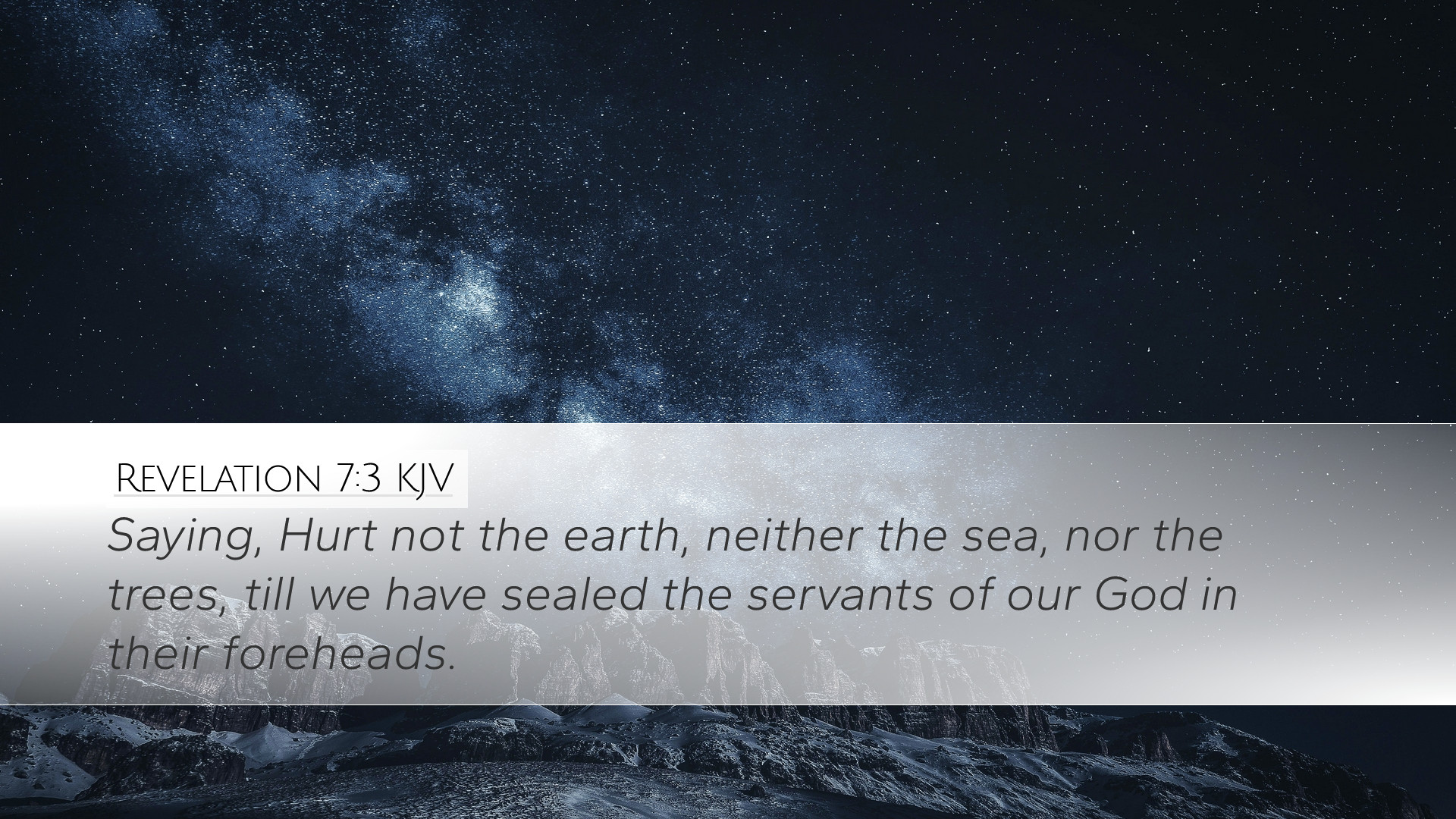Commentary on Revelation 7:3
Verse Quote: "Saying, Hurt not the earth, neither the sea, nor the trees, till we have sealed the servants of our God in their foreheads."
The verse in Revelation 7:3 serves as a pivotal point in the apocalyptic narrative, where the four angels are commanded to refrain from damaging the earth until God's servants are sealed. This moment carries significant theological implications, offering insights into God's sovereignty, protection, and the nature of His people in the last days.
The Context of Revelation 7
In the broader context of Revelation chapter 7, we find a juxtaposition between judgment and mercy. Following the opening of the sixth seal, which unleashes various cataclysms upon the earth, John is given a vision of divine preservation amidst impending judgment.
Exegesis of Revelation 7:3
- The Command of Restraint: The angels’ command to "hurt not" indicates a divine limitation on judgment. This shows God’s control over the forces of nature and the events unfolding in the last days. Commentators such as Matthew Henry note that no harm should come until God's purpose of sealing His servants is accomplished.
- The Earth, Sea, and Trees: The specific mention of these elements encompasses all creation, highlighting that divine judgment encompasses the entirety of nature. Albert Barnes emphasizes that this reflects the comprehensive scope of God's authority over creation, reinforcing the idea that everything is under His command.
- Sealing of the Servants: The sealing signifies God’s mark of ownership and protection. According to Adam Clarke, this sealing is emblematic of the preservation granted to those who belong to God; it reassures believers of their security amidst trials.
Theological Implications
Revelation 7:3 encapsulates several core theological truths relevant to pastors, students, theologians, and scholars:
- The Sovereignty of God: The command to restrain judgment until the sealing occurs underscores God’s sovereignty over history. All elemental forces, even those intended for destruction, operate under His authority.
- Divine Protection: The sealing of the servants signifies God’s commitment to protect His people. Henry elaborates on this by explaining that while trials and tribulations may be prevalent, God ensures that His faithful will endure and be safeguarded during times of torment.
- Understanding of the Servants: The term "servants of our God" denotes those who faithfully serve Him, and this sealing confirms their significance in the divine plan. Barnes affirms that this protective action emphasizes the distinction between God’s faithful and those who face judgment.
The Seal in Biblical Theology
The notion of sealing in Scripture is multifaceted, representing ownership, authenticity, and protection. This is evident throughout both the Old and New Testaments:
- Ownership: Just as a king would seal a document to establish authenticity, God's seal signifies His claim over His people (see Ephesians 1:13-14).
- Protection: The sealing also suggests security in a perilous time. Throughout Scripture, God’s people are often depicted as being protected amidst judgment (e.g., Noah and his family).
- Empowerment: The seal can be seen as a mark of empowerment for service—conveying that those who are sealed are equipped to endure trials and fulfill their roles in God’s plan.
Applications for Today
For contemporary readers, Revelation 7:3 serves as a reminder of the ever-present protection and sovereignty of God in the midst of chaos and uncertainty:
- Assurance in Trials: Believers can find solace and courage in knowing that they are sealed and protected by God. This should inspire confidence when facing worldly challenges.
- Call to Faithfulness: The call to be among God’s servants is a challenge to maintain faithfulness and commitment to His work. The expectation is clear that those sealed should live in a manner befitting their status.
- Witness to the World: This verse highlights the need for believers to bear witness to the truth of God’s protection and salvation, serving as a light in a world often besieged by darkness.
Conclusion
Revelation 7:3 invites deeper reflection on the themes of divine protection, sovereignty, and the faithful perseverance of God's people. Through the insights of noted commentators like Matthew Henry, Albert Barnes, and Adam Clarke, we are reminded of the theological richness contained within this passage. As we study this verse, may we continually embrace our identity as sealed servants of God and appreciate the profound assurance that comes from our relationship with Him.


